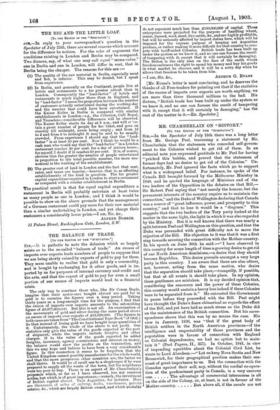THE. BALANCE OF TRADE.
[TO THE EDITOR OF THE "SPECTATOR:1
SIR,—It is pathetic to note the delusion which so largely exists as to the so-called "balance of trade." An excess of imports over exports leads numbers of people to suppose that we are being slowly ruined by exports of gold to pay for them. They seem unable to realise that gold is only a commodity, and is bought by exchanging for it other goods, and is im- ported by is for purposes of internal currency and credit and the, arts, and that the export of gold to pay for even a small portion of our excess of imports would lead to a financial
crisis. ' •.
The only way to convince those who, like Sir Conan Doyle, imagine that their motor-cars bought abroad are paid for in gold is to examine the figures over a long period. Taking thirty years as a long-enough time for the purpose, I find that the excess of imports over exports amounts to the astonishing figure of £3,377,600,000. But this is not all. An examination of the movements of gold and silver during the same period shows an excess of imports over exports of £43,828,000. (The figures in both cases are taken from "The Constitutional Year-Book "of 1902.) So that instead of losing gold we have bought large quantities of it. Unfortunately, the whole of the above is not profit. Our statisties only give the value of the goods exported at the port of shipment; while the imports • include freights and other charges. If to the value of the goods exported be added freights, insurance, agency commissions, and interest on money, the balance would show the profits on the transaction, and this we may hope and believe to have been a very considerable figure. In this donnection it seems to be forgotten that the United Kingdom cannot possibly manufacture for the whole world, and that the more prosperous other countries are, the better we shalltlirive. It would be of small use to a shopkeeper if he were prepared to supply all the wants of the town, but his neighbours were too poor to buy. There is an aspect of Mr. Chamberlain's proposals which, so far as I have observed, has not received notice, but which is of great importance,—namely, the investment of British capital abroad. Take Argentina, for instance. Here are thousands of miles of railway; docks, warehouses,- private estates, &c., which are largely British owned, and which probably
do not represent much less than £100,000,000 of capital. .These enterprises were projected for the purpose of handling wheat, maize, linseed, wool, meat, live cattle, &e., and are highly profitable, but will be seriously affected by import duties here, which will be imposed for the express purpose of keeping out Argentine produce, or rather making it more difficult for that country to com- pete with tariff-aided Colonies. British trade has been built up under the system as we know it, and no one can foresee the result of tampering with it, except that it will certainly be damaging. The Briton is the only man on the face of the earth whose freedom embraces the right to spend his money and buy his goods in what market he chooses, and it will be a sorry day when he allows that freedom to be taken from him.
[Mr. Evans's letter is most convincing, and he deserves the thanks of all Free-traders for pointing out that if the statistics of the excess of imports over exports are worth anything, we are more than three thousand millions to the bad. His dictum, "British trade has been built up under the system as we know it, and no one can foresee the result of tampering with it, except that it will certainly be damaging," has the root of the matter in it.—En. Spectator.]






































 Previous page
Previous page